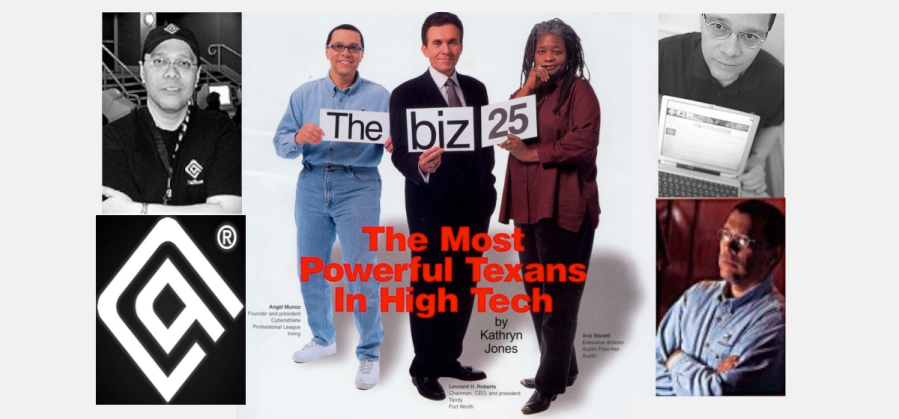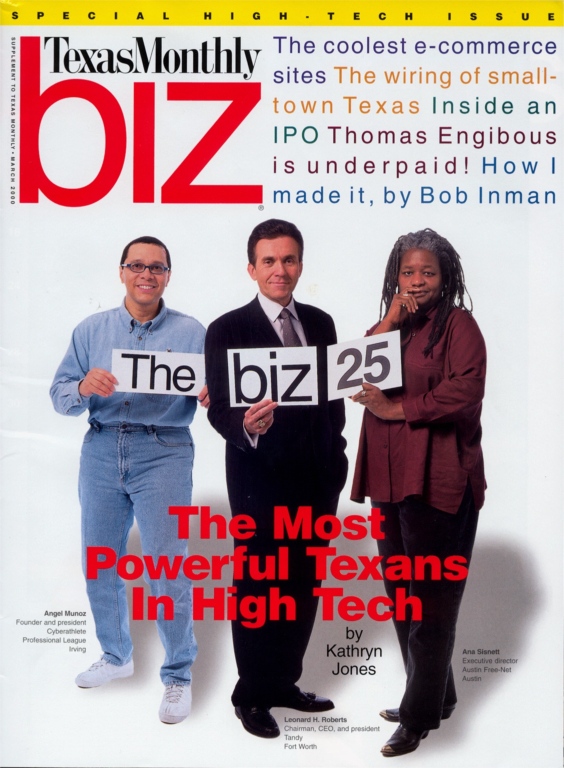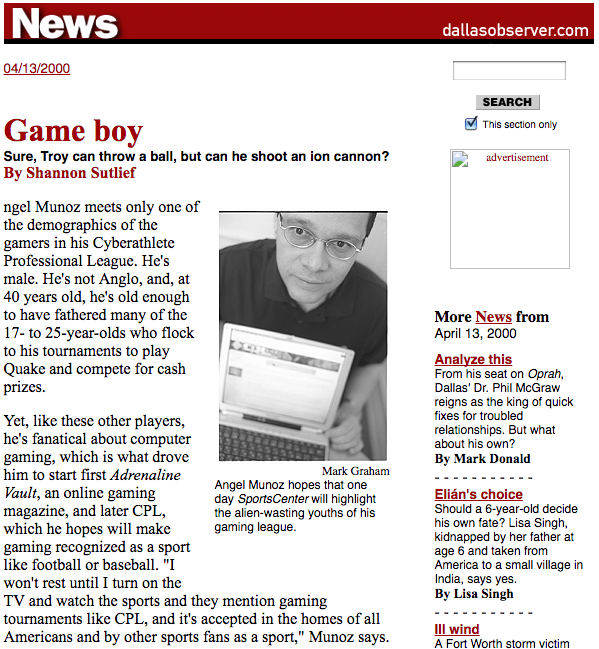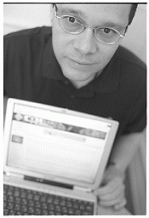THE BUZZ ON TEXAS BUSINESS: Wired Guns by Kathryn Jones
Angel Munoz, 39
Founder and President, Cyberathlete Professional League; Founder and President, Adrenaline Vault, Irving
Munoz is largely responsible for turning computer gaming into a full-fledged professional sport with corporate sponsorships and cash prizes. His Cyberathlete Professional League (CPL), launched in 1997, hosts gaming conventions and tournaments all over the country; this year it will expand into Asia, South Africa, Australia, Canada, and Europe. A onetime investment banker, Munoz also operates the Adrenaline Vault, one of the top gaming Web sites, with 3.4 million visitors a month. An avid gamer himself, he got the idea for the CPL after hearing about get-togethers where gamers linked themselves in local area networks. “I discovered their level of playing had exceeded the games’ limitations,” he says. “They were able to do things the programmers never envisioned.” Next month, the CPL will host a four-day event in Dallas, which is expected to draw 1,500 people and dole out $100,000 in prizes, including $40,000 to the winner. Sponsors of CPL events include pro sports standbys Gateway and Nike. Can a call from ESPN be far behind?
(not pictured, but from same article)
Mark Cuban, 41
Todd Wagner, 39
Co-founders, Yahoo Broadcast Services; Senior Vice Presidents, Yahoo!, Dallas
Cuban and Wagner showed what dot-com entrepreneurs in Texas can become: incredibly, unfathomably rich. The co-founders of AudioNet started out in 1995 with a transmitter set up in Cuban’s bedroom sending radio signals from Dallas station KLIF to home computers via the Internet. At first the company broadcast mainly sporting events. Then it began broadcasting presidential conventions and the like, demonstrating the Net’s multimedia potential. In May 1998 its named changed to Broadcast.com, and the rest is Wall Street history: In July 1998 the company’s IPO was the largest ever to date (it has since been surpassed). A year later, Web giant Yahoo! acquired the company for $5.7 billion. These days Cuban and Wagner don’t enjoy as high a profile (though Cuban’s is certain to rise as the new majority owner of the Dallas Mavericks), but they do have the power of Yahoo! behind them; Cuban is scouting for new opportunities in digital media, while Wagner is more involved in the company’s day-to-day operations. And the operation is expanding: Late last year Yahoo Broadcast announced it would stay in its converted warehouses in Dallas’ inner-city Deep Ellum neighborhood and add seven hundred jobs.
Leonard H. Roberts, 51
Chairman, CEO, and President
Tandy, Fort Worth
Roberts is leading the venerable neighborhood RadioShack stores—once best known for selling batteries, electronic toys, and tape recorders—into the new territory of wireless networks and the Internet. In 1999 he brokered an alliance with Microsoft that will expand RadioShack’s reach on the Web (other big Internet players and retail chains quickly followed suit). Roberts, who became RadioShack’s president in 1993 and engineered alliances with Compaq, Sprint, and RCA, is also making the chain a dominant player in the wireless phone market. It’s already the leading seller of cellular and PCS digital phones and is the biggest retailer of satellite TV systems. No longer does RadioShack want to be America’s electronics store; if Roberts has his way, it will be America’s telecommunications store.
Ana Sisnett, 47
Executive Director
Austin Free-Net, Austin
In the most wired city in Texas, almost a third of the residents have Internet access; Sisnett is extending a hand to the two thirds who don’t. With funding from the U.S. Commerce Department and the state and through a partnership with the City of Austin, the nonprofit Austin Free-Net sets up free Internet access to computers in such public places as libraries and community centers. More important, it provides education and training about the Internet to those who don’t have computers of their own. Sisnett, who hails from Panama and has traveled the world teaching people about all things digital, says that giving everyone a computer isn’t going to bridge the gap; what makes a difference is getting out into the community and showing people the benefits and limitations of new technology. “Just because a person is low income,” she says, “doesn’t mean they’re a have-not.”
Dallas Observer: Game Boy by Shannon Sutlief
Angel Munoz meets only one of the demographics of the gamers in his Cyberathlete Professional League. He’s male. He’s not Anglo, and, at 40 years old, he’s old enough to have fathered many of the 17- to 25-year-olds who flock to his tournaments to play Quake and compete for cash prizes.
Yet, like these other players, he’s fanatical about computer gaming, which is what drove him to start first Adrenaline Vault, an online gaming magazine, and later CPL, which he hopes will make gaming recognized as a sport like football or baseball. “I won’t rest until I turn on the TV and watch the sports and they mention gaming tournaments like CPL, and it’s accepted in the homes of all Americans and by other sports fans as a sport,” Munoz says.
A sport? Pale, twitchy game players are jocks? Why not? Munoz asks. If ESPN can cover bass fishing, then certainly guiding your space Marine through mazes while wasting laser-pistol-toting aliens can qualify, he reasons.
After all, golf is considered a sport.
Munoz’s gamers, like other athletes, have to practice, possess good reflexes and a sense of strategy, and be conscious of their abilities and the game’s rules while competing. “Contrary to what people believe, it’s not just people moving a mouse around,” he says. “That’s like saying race-car drivers just steer a car. People don’t realize they need all these specialized skills. Without a question I consider this a sport. It is absolutely a sport.”
Of course, it’s hard to see “sport” in an event in which the players can, theoretically, also munch Cheetos while practicing, but Munoz’s argument strikes a chord with some players, like Main Street Internet’s gaming technician Bryan England. The Deep Ellum cyber café and bar hosted a qualifier for the Dallas competition that brought 35 players from as far away as Arizona to compete for seats at the CPL event.
“Angel believes these players are the same as athletes because of the skills they use and their hand and eye coordination,” England says. “Some people don’t think bowling is a sport, or golf, because the players aren’t in top physical condition. But if you say a sport involves having enormous skill and the top players make a lot of money, then, yes, gaming is a sport.”
Days before the tournament, the members of the Australian, Korean, New Zealand, and South African teams are practicing at Main Street Internet, where 20 of the cyber bar’s computers and two of its rooms are devoted to gaming. Local players who practice there regularly join them. They know one another by handle (their gaming names) or from past events. This is the first time they’ve had a public place to meet and practice together. As at the CPL competition, the players bring their own mice, keyboards, and mouse pads — their own set of clubs, as it were.
“They’ve even discussed bringing their own chairs,” England says. “It’s all a matter of maximum comfort.” However, they all use the same computers in competition. Gateway Computers, one of the league sponsors, provides 100 terminals for CPL and connects them on a network.
More than 500 players begin; the last man — they’re almost all male — standing wins. CPL tournaments are really just large versions of the game parties players have been throwing at their houses for years. Munoz’s league created a set of rules, nabbed sponsorships to provide hardware and prizes, and convinced the gamers who visited the avault.com Web site to compete. “We haven’t invented anything, we’ve just formalized the process,” Munoz says. “The only thing we can take credit for is making it professional.”
If attracting top gamers and sponsors was the first step, the next step may be harder. He has to get people who know little or nothing about computer games to accept that playing them can be as exciting and competitive as other professional sports. There’s also the question about whether violent video games can cause violence in teenagers. Quake, a popular “first-person shooter” game, has been blamed for teaching teens involved in recent school shootings how to aim, fire, and repeat for mass killing.
This is where Munoz has to act his age and play a father’s role. Quake is rated by the Entertainment Software Ratings Board as mature, which means that players must be 17 years old to purchase it. Because of the rating, Munoz doesn’t allow anyone under 15 years old into the arena. Participants who are 16 and 17 year old must bring a signed permission slip from their parents.
Players still come from across the world to compete. The next competition, which takes place Thursday through Sunday at the Hyatt Regency near Reunion Arena, will bring 374 players from Texas and about a hundred from outside the United States, including 21 from the United Kingdom and 12 from Sweden. Several countries send teams to the CPL competitions. Sponsors pay for the trip; some even pay players to practice online eight to 10 hours a day. The winner of the Dallas CPL tournament will receive $40,000 cash, with another $60,000 going to the other top players. And in a move that is sure to horrify parents who think little Billy is just wasting his time wasting mutants, next year, Munoz plans to double the cash prizes. It’s now possible for top players to live off of earnings from competitions and sponsorships.
As of yet, the NCAA has not sanctioned college scholarships.
These days Munoz devotes himself wholly to the Dallas-based CPL, which he began three years ago for players he met through Adrenaline Vault whose skills had exceeded personal and online play. His first CPL competition was October 1997 in Dallas. About 500 people attended. This year he expects more than 500 to compete, plus spectators to watch the games, play in unofficial side games, and visit lectures by gaming experts and an exhibit of software and hardware vendors. Since the first Dallas tournament, he’s taken the league across the world, holding tournaments in other countries and founding specialized leagues on other continents. CPL Asia is stationed in Singapore, and CPL Europe calls Denmark home. There are also satellites in Germany, Greece, and the United Kingdom.
All this began because Munoz was bored with his job. He owned a Dallas investment banking firm, but was tired of investing money is other people’s ideas. He also wanted more time for his family. He sold off some of the firm’s assets so he wouldn’t have to work, and began playing video games. He started a publishing company called NewWorld.com and founded Adrenaline Vault. The site grew into a magazine by merging other Web sites and their staffs into his, making it like a newspaper where each section has its own specialized writers. “We were excited when we had 100 visitors a month,” he says. “Now we receive 3.5 million visitors a month.” He has a publisher and an editor running Adrenaline Vault now so he can focus on making gaming a respected, professional sport. “I’ve never been so excited in my life as I am about this,” he says “The only thing I’m still waiting on is that call from ESPN, and then everything will all fall together.”








